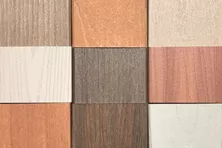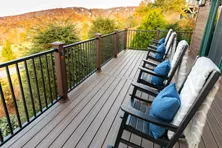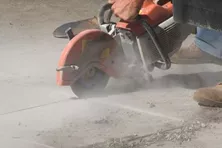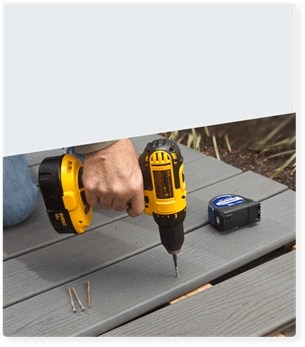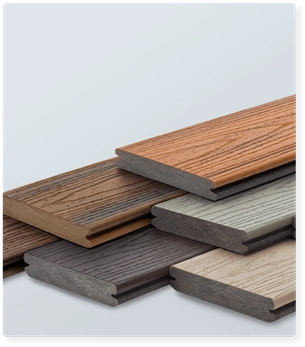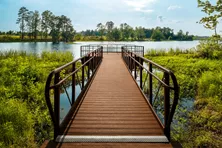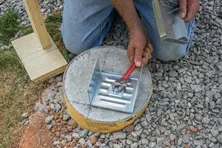Comparing Composite vs Wood Decking
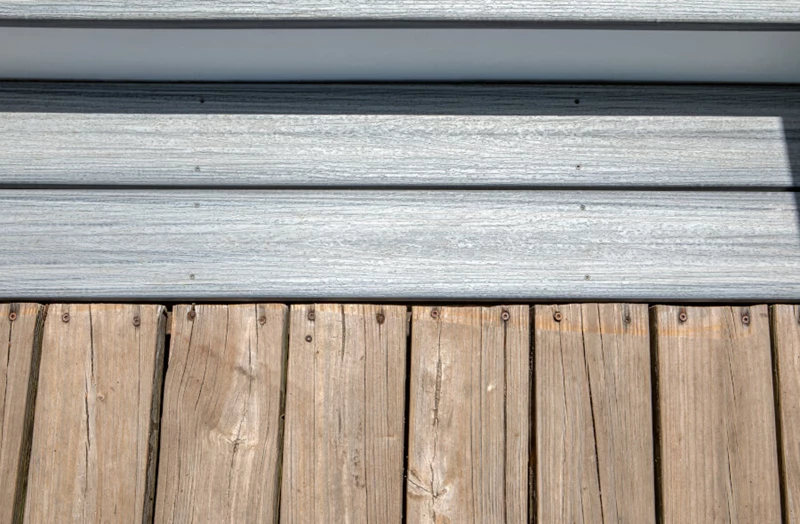
Composite decking has exploded in popularity in the last several years, pushing all potential deck-builders to seriously consider the pros and cons of the material against traditional wood construction. In the head-to-head matchup of composite vs. wood decking, several factors play a role in the final decision, including:
- Maintenance and durability
- Costs
- Appearance
- Sustainability and environmental impact
Depending on a customer’s financial reality and design considerations, both options might be a winner. But to understand the long-term value of wood vs. composite deck materials, let’s weigh the pros and cons of each.
The Case for Composite Decking
What makes composite decking such a great choice? For starters, once installed, composite decks need very little maintenance. This benefit is particularly noticeable when you compare composite vs. wood decks.
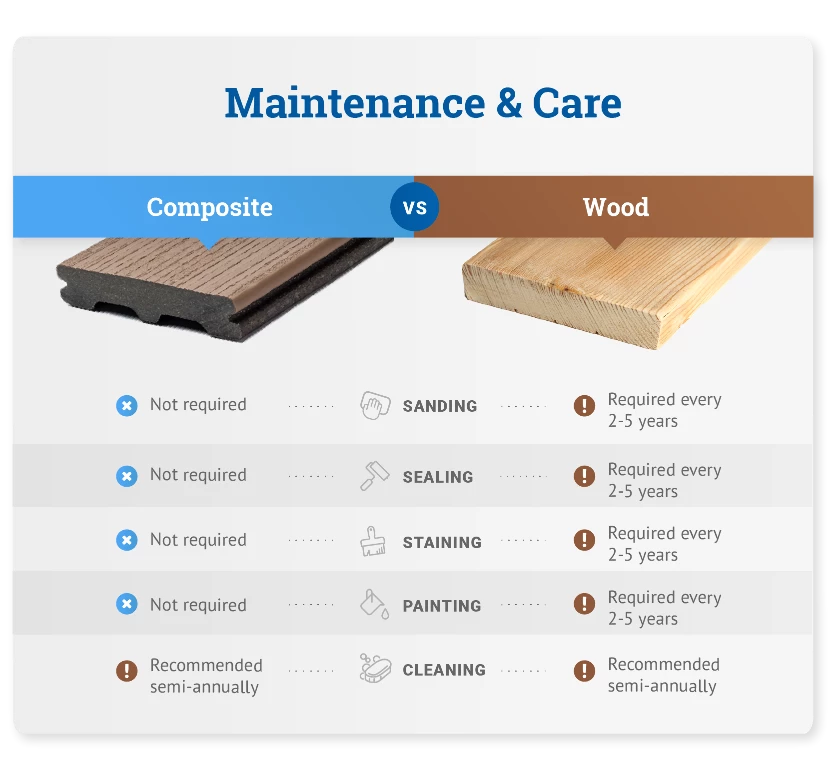
Maintenance and Durability
Composite decks require only some semi-annual cleaning — a simple pressure wash or even an intensive soap and water scrub is usually enough. The bonus for composite is it doesn’t need sanding, sealing, or staining. While those living in particularly harsh environments (prone to heavy rain or snow, for example) might need to clean their deck more often, that is true despite the material used to make their deck.
How long does composite decking last?
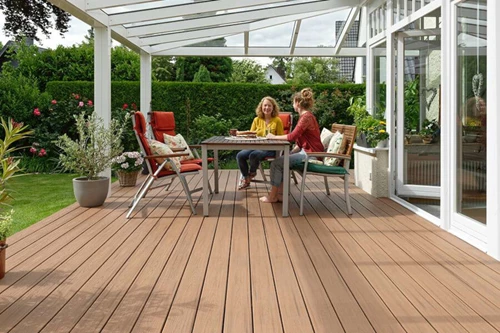
Apart from extreme circumstances like fire damage, high-end composite decking should last for decades. Thanks to the material's durability, composite materials come with excellent warranties that make them a better long-term investment (but more on that later). Trex’s weather-resistant shells, for example, offer warranties of 25 to 50 years on deck boards and accessories.
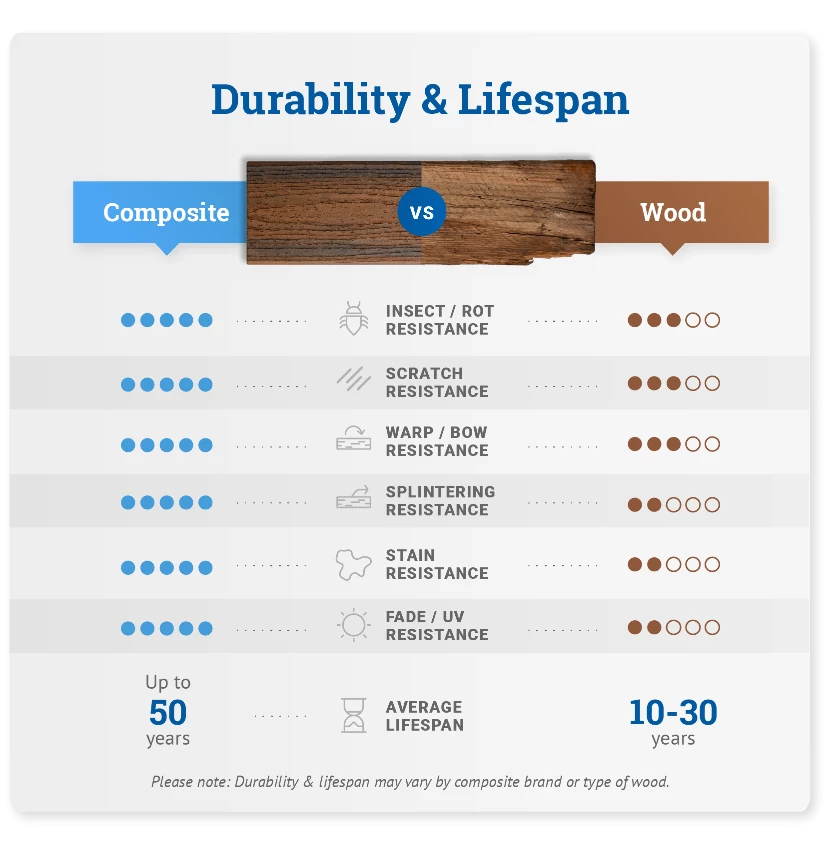
Costs
Initial costs for composite materials tend to be higher than most wood materials, often leading to hesitation on the part of buyers. But a little research goes a long way to clearing any doubts about costs. Here’s how it breaks down for the basic Trex decking option, Trex Enhance® Basics:
- Per installation costs: $30-$60 per square foot for installation
- Typical deck material costs: $3,619 - $5,090 for a 35' x 22' deck made from Trex Enhance Basics
- Maintenance costs: $0 - negligible for Trex Enhance Basics
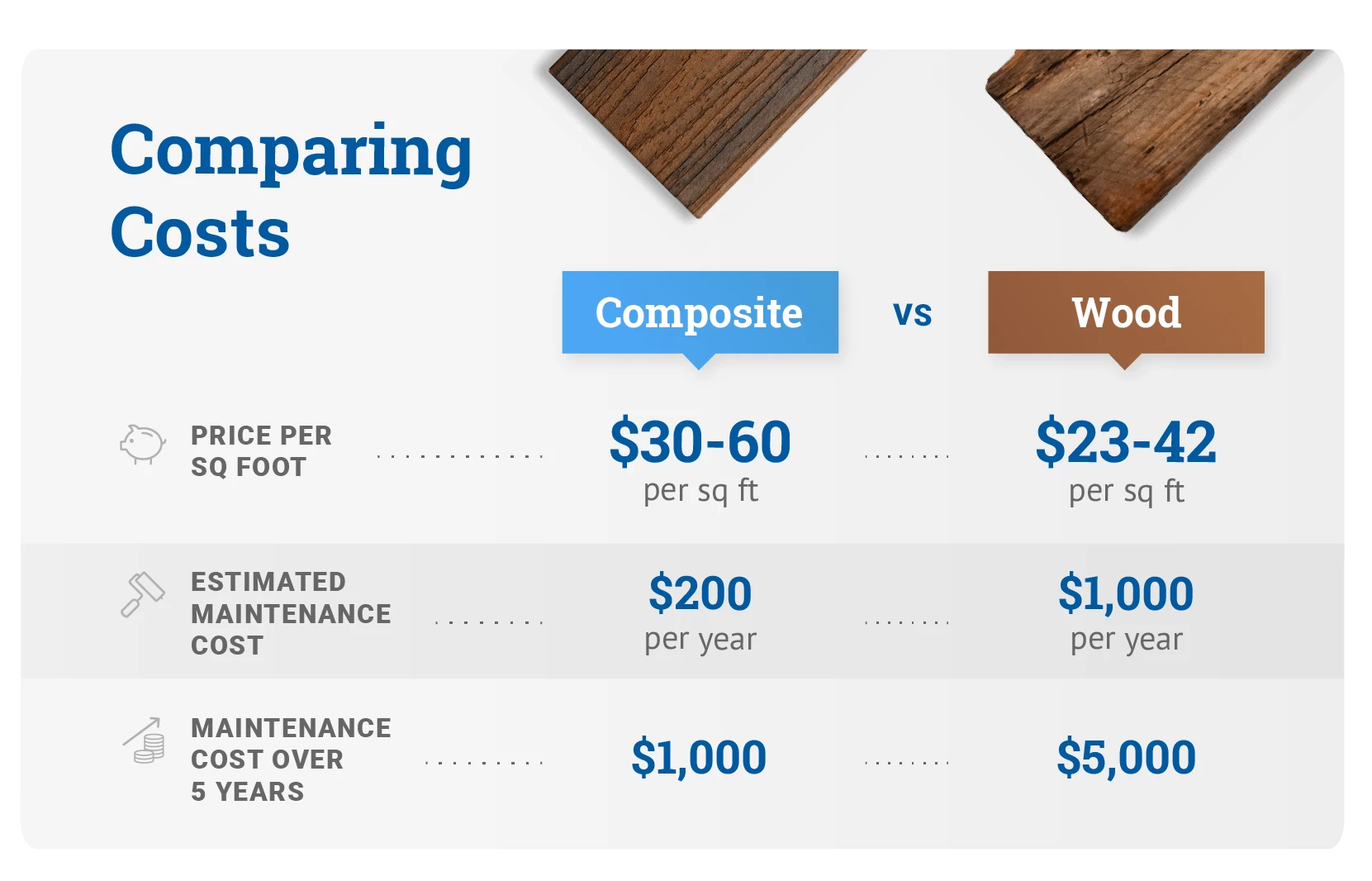
Is composite decking worth it?
As cost comparisons show, installing composite decking is more expensive upfront than using pressure-treated wood — the specialized material demands a higher cost. However, maintenance costs for composites are drastically reduced to near zero. Since water wear and insect damage are not factors, the only perceptible costs would be:
- Physical damage
- Cleaning costs (with brush and detergent)
For those calculating their long-term investment, composite decks will outperform wood deck costs within a decade — before even mentioning the benefits many composite manufacturers like Trex might provide, including 25- to 50-year warranties.
Appearance
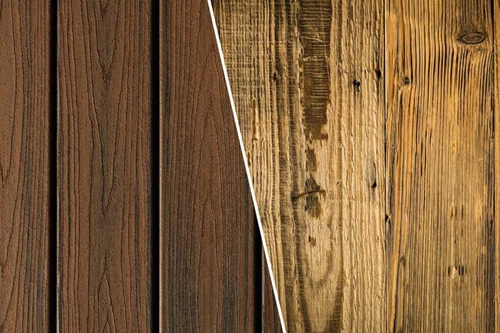
Great aesthetics usually come down to the quality of the material and the creativity of the construction and design. In that spirit, composite decking offers greater diversity in design than wood decking, with more hues, tones, and patterns available.
The difference between the two materials lies in authenticity, preference, and ongoing customization. Those seeking a pure wood deck may not find the advantages of composites to their liking. Though composite decking can compete with wood aesthetically, its physical makeup is decidedly different. Wood can be stained and painted over time, whereas composite materials do not change. This provides the benefit of a great look that lasts for years to come — but the trade-off is the inability to swap in a new color or stain in a few years if your tastes change.
Sustainability and Environmental Impact
Composite decking is the clear favorite for eco-conscious consumers — made from recycled materials, such as plastic film and reclaimed sawdust, this option guarantees a better carbon footprint for the buyer.
Alongside the material difference, composite decking is inherently more durable. With minimal maintenance and cleaning required, consumers will use fewer resources and chemicals in their deck upkeep.
The Case for Wood Decking
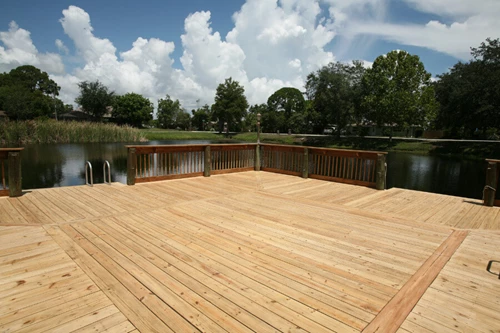
As scientifically advanced as some composite products are, wood purists can’t help but pine (no pun intended) for the classics. Let’s see what makes wood a possible fit for your outdoor deck.
Maintenance and Durability
Wood has some natural durability but requires far more maintenance than composite materials. From environmental factors like water and insect damage to higher material breakability, wood deck owners need to be more cautious and proactive than composite deck owners to maintain a pristine deck.
How long do wood decks last?
Wood decks typically require sanding, cleaning, staining, painting, and sealing every one to two years. Left untreated, the wood and the deck as a whole would crumble — but a well-cared-for deck could last 15 years and beyond.
Risk of moisture and insect damage
Other lingering issues with wood are the environmental factors that contribute to wear and tear. Wood is more prone to these problems than composite because of its natural construction, leaving it prey to any of the following if not treated:
- Warping
- Cracking
- Splintering
- Growing mold and mildew
- Rotting and weakening
- Insects and pests
Insect and pest damage is a particularly problematic factor if your wood deck has experienced any water damage. Certain softwoods need to be regularly treated with chemicals to waterproof them and repel bugs, which constitutes an additional ongoing cost depending on your material of choice.
Costs
Wood is a fairly cheap material, especially compared to synthetic alternatives like composite decking. That being said, long-term costs might balance things out. Here’s how it breaks down:
- Per installation costs: $15-$30 per square foot for installation
- Typical deck material costs: $1,271 - $2,880 for pressure-treated lumber
- Maintenance costs: $451/year for pressure-treated lumber
Maintenance costs are the burden of wooden deck owners — annual estimated spending of $451 over 15 years, for example, would accumulate to $6,765. This could balloon even further depending on the size of your deck and the natural threats of your local environment. Maintaining a wood deck also requires a lot of physical labor over the years; something that can take a toll on an aging body.
Is wood decking worth it?
If money is no object and you’re committed to wood and the labor required to maintain it, a decent deck could last a decade or two. But for longer-term savings on your deck, wood simply does not reach the cost durability of composite decking. Overall maintenance costs will include:
- Staining and coating
- Pressure washing
- Adding water resistance/repairing water damage
- Repairing insect damage
- Repairing breakage
Appearance
A key factor in many deck owners’ selections, wood has a more naturally authentic feel than many forms of composite decking. In particular, the more expensive hardwoods like redwood or bamboo provide a rustic, high-quality look and feel that most composite decking can't match. The new Trex Signature decking collection, however, is the first to compete against more expensive hardwoods in color and grain pattern.
Sustainability and Environmental Impact
If you're looking for an affordable upfront option with Pressure-treated lumber or committed to the look of real wood, wood might be the option for you. However, if you are interested in looking for an eco-friendly option with minimal maintenance and a better lifetime value, composite decking is the material for you.
On top of the impacts of deforestation, wood decks almost always need heavy treatment with various external chemicals on a repeated basis. Varnishes, oils, and more help maintain deck durability, but can negatively affect your backyard or local environment over time.
Composite vs. Wood Decking: The Verdict
The argument of composite vs. wood decking all comes down to preference in the end — those set on making wood decks work can find a durable, affordable upfront solution with pressure-treated lumber that offers more long-term customization options with stains and colors.
But for those comfortable with paying more upfront in favor of long-term durability and lower maintenance costs, composite decking offers an eco-friendly option for deck-builders that wood simply can’t rival.
Learn More About Composite Decking
However you choose to move forward with your deck materials, Decks.com has a wide range of resources to help you put your dreams into action. Check out these additional resources to see how much your composite or wood deck will cost in installation, how to incorporate other features, and even how to swap out wood for composite if you change your mind down the line.
Capped Composite Decking
What is capped composite decking? It's a great option if you like the look of wood but not the maintenance. Learn about capped composite at Decks.com.
Dream Deck
Dream Deck vinyl decking is manufactured by Thermal Industries in Pittsburgh, PA.
Best Composite Decking Materials & Options for 2024
Low maintenance composite decking materials are a great option when thinking long-term. Discover the best composite decking material options for your home.
Cutting a Concrete Pad
Learn how to use a concrete saw to cut a hole in a patio slab to install a deck footing.
Deck Footing Depth
Find out how deep you need to dig your footings in your area. Look at our U.S. map of extreme frost penetration.
Can I reuse existing footings
Our inspector discusses the topic of reusing footings for a new deck.
More Helpful Resources
Explore Articles by Topic
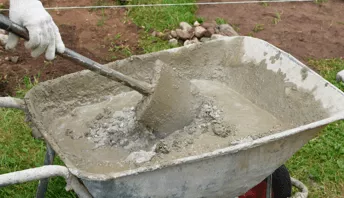
Footings
Information related to installing frost footings for decks
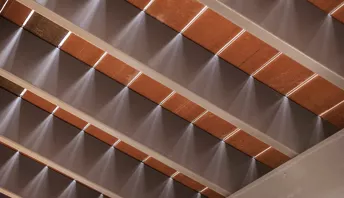
Framing
Learn structural framing methods
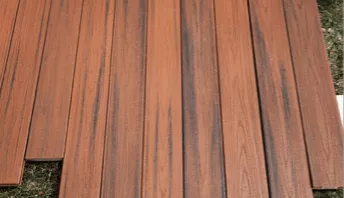
Decking
Learn about wood and composite decking materials
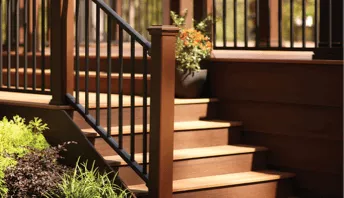
Stairs
An in-depth look at the complex issue of how to build stairs
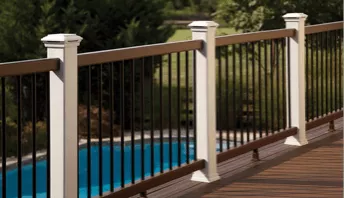
Railings
How to install guardrails and handrails to meet IRC code
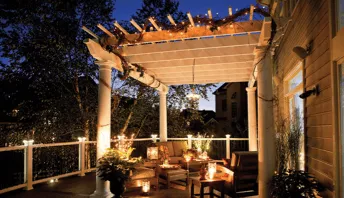
Features
An overview on water drainage, benches, planters and lights
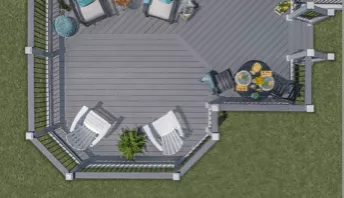
Design
The basics of deck design
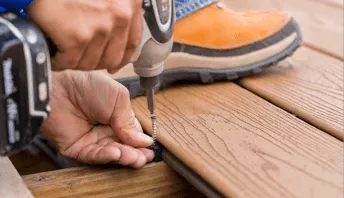
Planning
Learn about permits and working with contractors
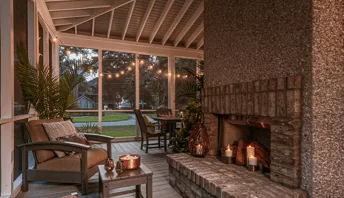
Porches & Patios
Build a covered deck to enjoy all seasons
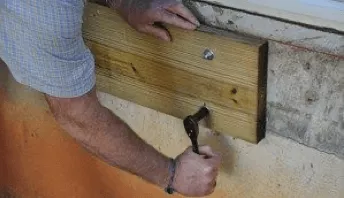
Ledger
Proper attachment techniques
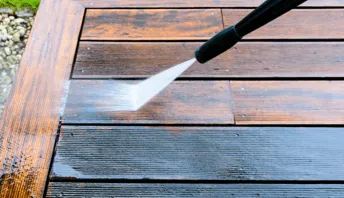
Care
Maintain your deck to maintain your investment
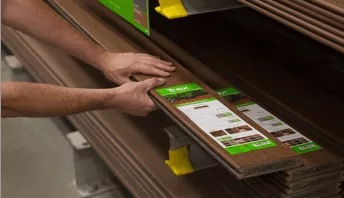
Materials
An overview on water drainage, benches, planters and lights
Eco Friendly Composite & Wood Decking Options
Looking for the most environmentally friendly way to add a gorgeous deck to your home? Learn how composite decking is made from recycled materials at Decks.com.
Choicedek
Choicedek composite decking is manufactured by Advanced Environmental Recycling Technologies, Inc.
Genovations Vinyl
Genovations Vinyl Decking is manufactured by Genova Products, Inc. in Davison, MI.
How many footings do I need?
Learn how to determine the number of footings and support posts you need for your deck when designing your deck frame.
Do I need to use rebar?
Our inspector discusses using steel rebar for deck footings.
Can I use pier blocks?
Our inspector explains the pros and cons of using pier blocks for deck foundations.
Explore Articles by Topic

Footings
Information related to installing frost footings for decks

Framing
Learn structural framing methods

Decking
Learn about wood and composite decking materials

Stairs
An in-depth look at the complex issue of how to build stairs

Railings
How to install guardrails and handrails to meet IRC code

Features
An overview on water drainage, benches, planters and lights

Design
The basics of deck design

Planning
Learn about permits and working with contractors

Porches & Patios
Build a covered deck to enjoy all seasons

Ledger
Proper attachment techniques

Care
Maintain your deck to maintain your investment

Materials
An overview on water drainage, benches, planters and lights





